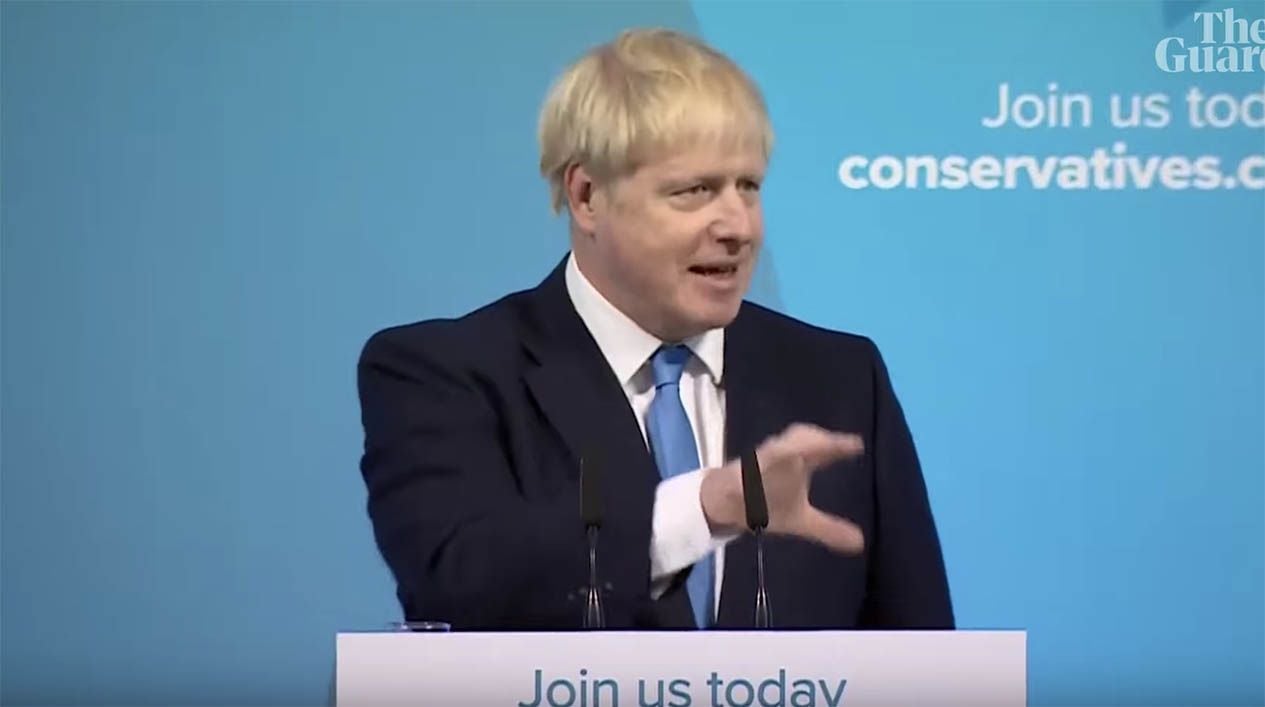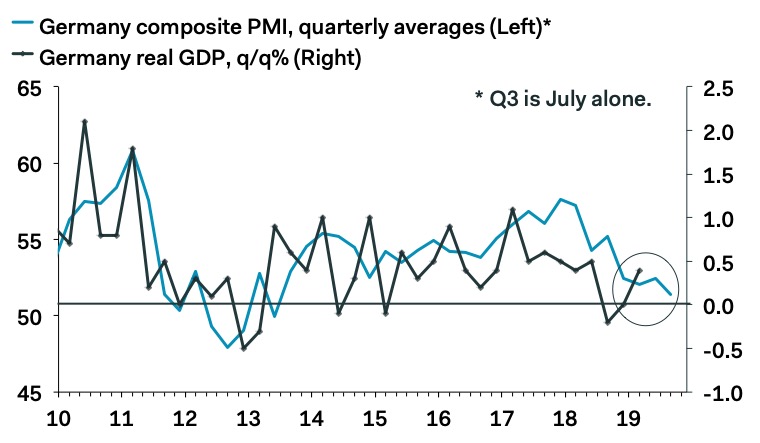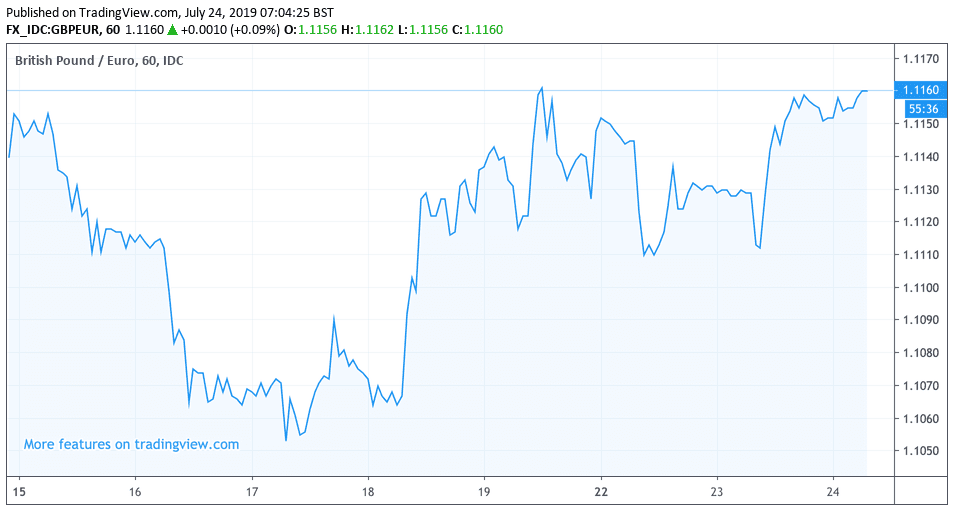Pound Sterling will Struggle to Go Much Lower vs. Euro: Nomura

The British Pound is said to already be trading at crisis levels, and as a result it will struggle to fall much lower says an analyst at leading global investment bank.
GBP is already "trading at crisis levels, and will struggle to go much lower," says Jordan Rochester, foreign exchange strategist with Nomura in London.
That the Pound is already low by historical standards, it would suggest it will take successive bouts of bad news to really push new lows.
We wonder where such news might come from.
The Pound has recovered ground against the Euro over the course of the past 24 hours with news that Boris Johnson would replace Theresa May as Prime Minister on Wednesday.
The Pound-to-Euro exchange rate has recovered to 1.1160, having been as low as 1.1047 just last week.
"The Pound was volatile yesterday following Boris Johnson’s victory speech, as well as remarks from the BoE’s Haldane and Saunders who indicated they are not likely to vote for a rate rise in the near term. The Euro is under pressure ahead of tomorrow’s ECB policy announcement. The ECB is expected to prepare the ground for lower interest rates in September, although there is an outside chance of a reduction as early as tomorrow," says Hann-Ju Ho, an economist with Lloyds Bank.
We would like to say the Pound is rallying exclusively on news Johnson is taking over, but we expect the picture is a great deal more nuanced: markets have known for weeks Johnson was incoming, and we believe they are now awaiting the next decisive moves on Brexit policy for guidance.
Furthermore, markets will be watching to see whether a General Election is likely in the UK before pulling the trigger on further Sterling declines.
Nomura's Rochester also makes the point that the change at the top of the UK's leadership extends well beyond the Prime Minister's office:
"Over the next few weeks and months, the leadership transition will not only include a new Prime Minister, but a complete changing of the guard. In addition to a new PM, the UK can also look forward to seeing replacements for Chancellor, Cabinet, Bank of England Governor, budget and Brexit plan.
Despite the expected leadership changes, Rochester notes implied volatility levels in Sterling are still below levels seen back in March when markets were showing notable nerves over the prospect of potential big moves around the original Brexit date, and therefore "a lot of the negative news has been priced into spot," says Rochester.
In short, the Pound is at levels that suggests it has eaten a decent share of bad news.
"GBP already trades at crisis levels and typically struggles to move much lower," says Rochester. 'While we acknowledge that a no-deal Brexit is a risk and would very likely record new lows in GBP, we do not expect the market to assign a higher hard Brexit premium than previously or until parliament returns after the summer break in September."
Above: GBP/EUR since 2009: Sterling is at already-low levels, and it might struggle to fall lower
We believe the conditions for a recovery in Sterling over coming weeks, that coincides with Parliament's summer break, is a distinct likelihood.
After all, this is a political currency, and with no politicians to bother it the prospect of a recovery grows.
Time to move your money? Get 3-5% more currency than your bank would offer by using the services of foreign exchange specialists at RationalFX. A specialist broker can deliver you an exchange rate closer to the real market rate, thereby saving you substantial quantities of currency. Find out more here.
* Advertisement
Euro Hit by Dire Manufacturing Data
The Euro was in retreat from a steady Dollar and stronger Pound Sterling Wednesday after IHS Markit surveys for July pointed to a renewed economic slowdown in the Eurozone in the third-quarter, prompting calls for the European Central Bank (ECB) to support the economy with interest rate cuts and more quantitative easing as soon as this Thursday.
The IHS manufacturing PMI fell to a 79-month low of 46.4 in July, from 47.6 in June, when financial markets had looked for it to remain unchanged.
However it was German manufacturing PMI which proved an eye-opener: the German Manufacturing PMI read at 43.1, well below expectations for 45.1.
Anything below 50 suggests contraction, it is therefore little wonder that Euro exchange rates are in retreat on the numbers:
The Pound-to-Euro exchange rate extended its short-term uptrend on the numbers to record a near-month high at 1.1207.
The Euro-to-Dollar exchange rate fell to close in on a new two-month low at 1.1139.
Meanwhile, the Eurozone services sector PMI fell from 53.6 to 53.3, in line with the market consensus.
The composite PMI, which combines the two previous surveys, fell from 52.2 to 51.5 this month suggesting that while the economy is still expanding it is close to stalling.
New order flows stagnated in the manufacturing sector this month and confidence hit its lowest level since late 2014, leading companies to become more cautious about hiring new employees, IHS Markit says.
Exports were the weakest link again and many companies were forced to begin clearing old work backlogs to sustain output.

Above: Pantheon Macroeconomics graph showing PMI correlation with Eurozone GDP growth.






